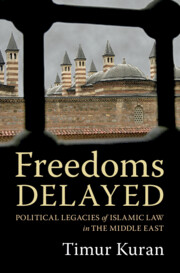Book contents
- Freedoms Delayed
- Freedoms Delayed
- Copyright page
- Dedication
- Contents
- Figures
- Tables
- Preface
- Part I The Modern Middle East’s Authoritarian Face
- Part II Persistent Social Atomization
- Part III Religious Repression
- 7 Religious Freedoms in Middle Eastern History
- 8 The Marginalization of Islam
- 9 The Resurgence of Assertive Islamism
- 10 Religious Diversification, in Fact and in Law
- 11 The Absence of Liberal Islamic Schisms
- Part IV Economic Hindrances
- Part V Conclusion
- Notes
- Bibliography
- Index
10 - Religious Diversification, in Fact and in Law
from Part III - Religious Repression
Published online by Cambridge University Press: 20 July 2023
- Freedoms Delayed
- Freedoms Delayed
- Copyright page
- Dedication
- Contents
- Figures
- Tables
- Preface
- Part I The Modern Middle East’s Authoritarian Face
- Part II Persistent Social Atomization
- Part III Religious Repression
- 7 Religious Freedoms in Middle Eastern History
- 8 The Marginalization of Islam
- 9 The Resurgence of Assertive Islamism
- 10 Religious Diversification, in Fact and in Law
- 11 The Absence of Liberal Islamic Schisms
- Part IV Economic Hindrances
- Part V Conclusion
- Notes
- Bibliography
- Index
Summary
Disagreements over a religion’s interpretation can cause a schism – a formal division into variants with their own officials, doctrines, and rituals. Islam’s Sunni–Shii split over succession disputes came early in its history. One might expect either Muslim modernizers or liberal Muslims to have split Islam further. They have done so only informally, in that the global Muslim community is divided between practicing and nominal Muslims. But nowhere in the Middle East is discontent lacking among practicing Muslims over state-approved interpretations. This is evident in the popularity of unregulated fatwa services. Substantial constituencies consider rituals outdated, clerics unprincipled, and gender discrimination unacceptable. But widespread discontent within a religious community need not generate a disunion. If the risk of joining the leavers is grave enough, disaffected members will stick with the status quo. A successful schism requires, at some stage, open collective action on the part of a constituency with a shared religious vision, possibly under leaders able to strategize, represent the membership, and coordinate moves. Also necessary is that supporters of the religious status quo lack the organizational capacity to erect roadblocks. At present, any group trying to develop an alternative to Sunnism or Shiism would face major resistance.
Keywords
- Type
- Chapter
- Information
- Freedoms DelayedPolitical Legacies of Islamic Law in the Middle East, pp. 171 - 189Publisher: Cambridge University PressPrint publication year: 2023



